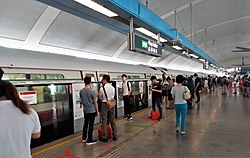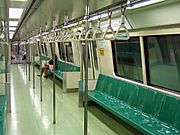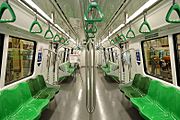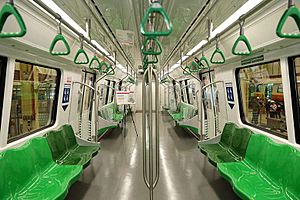Siemens C651 facts for kids
Quick facts for kids Siemens C651 |
||||
|---|---|---|---|---|

A Siemens C651 train approaching Paya Lebar MRT station.
|
||||
| In service | 2 May 1995 - present | |||
| Manufacturer | Siemens AG | |||
| Assembly | Vienna, Austria | |||
| Constructed | 1993–1994 | |||
| Refurbishment | Singapore Rail Engineering 2016–2018 |
|||
| Number built | 114 Vehicles (19 Trainsets) | |||
| Number in service | 108 Vehicles (18 Trainsets) | |||
| Formation | 6 per trainset DT–M1–M2–M2–M1–DT |
|||
| Fleet numbers | 201/202 ~ 237/238 | |||
| Capacity | 1920 passengers 372/336 seats |
|||
| Operator(s) | SMRT Trains (SMRT Corporation) | |||
| Depot(s) | Bishan Changi Tuas Ulu Pandan East Coast (Future) |
|||
| Line(s) served | EWL East West Line NSL North South Line |
|||
| Specifications | ||||
| Car body construction | Aluminium-alloy double-skinned construction | |||
| Car length | 23 m (75 ft 5+1⁄2 in) | |||
| Width | 3.2 m (10 ft 6 in) | |||
| Height | 3.7 m (12 ft 1+5⁄8 in) | |||
| Doors | 1,450 mm (57+1⁄16 in), 8 per car | |||
| Maximum speed | 90 km/h (56 mph) (design) 80 km/h (50 mph) (service) |
|||
| Weight | 35 t (34 long tons; 39 short tons) (unladen) 53.8 t (53.0 long tons; 59.3 short tons) (laden) |
|||
| Traction system | Current: GTO–VVVF PWM (Siemens) Replacement: IGBT–VVVF (Toshiba) |
|||
| Traction motors | Current: Three-phase AC induction motor enclosed-ventilated lateral drive 140 kW (190 hp) (Siemens) Replacement: Permanent Magnet Synchronous Motor (Toshiba) |
|||
| Power output | 2.24 MW (3,000 hp) | |||
| Transmission | 5.94 : 1 Gear Ratio | |||
| Acceleration | 1.0 m/s (3.3 ft/s) | |||
| Auxiliaries | 110 V DC | |||
| Electric system(s) | 750 V DC third rail | |||
| Current collection method | Collector Shoe | |||
| UIC classification | 2'2' + Bo'Bo' + Bo'Bo' + Bo'Bo' + Bo'Bo' + 2'2' | |||
| Braking system(s) | 1st service brake: Self-excited, mixed service and resistor brake 2nd service brake: Pneumatic compressed air wheel tyre block brake Parking brake: Compressed air pressure spring-loaded brake |
|||
| Safety system(s) | Current: Thales SelTrac® Moving Block Communications-based train control (CBTC) ATC with subsystems of ATO GOA 3 (DTO), ATP, NetTrac ATS, CBI Past: Westinghouse Brake and Signal Company Ltd fixed block ATC with subsystems of ATO GOA 2 (STO), ATP, ATS |
|||
| Track gauge | 1,435 mm (4 ft 8 1⁄2 in) standard gauge | |||
The Siemens C651 is a type of train used in Singapore. It's also called Contract 651 or SIE C651. These trains are the second kind of electric trains to run on Singapore's MRT system. They operate on the North South and East West Lines. A total of 114 train cars were bought in 1993. These cars make up 19 train sets. They started running in 1994 and were built by Siemens in Austria.
Contents
About the C651 Trains
The C651 trains are the second generation of train cars used on the SMRT network. They cost about $259 million. These trains were bought to help the network carry more passengers. This was especially important because of the new Woodlands extension opening. The first C651 train arrived in Singapore on September 20, 1994.
Unlike the first trains, the C151 models, the C651s have a special paint job. This paint helps to reduce scratches from dirt. The older C151 trains often got dirt stuck on them, which was hard to clean.
Train Features
These trains have greenish-blue windows from a German company called Glastroch. They look quite similar to the first generation trains before those were updated. One big difference is the sound they make. C651 trains have a louder, lower-pitched sound when they speed up or slow down.
The display at the front of each train shows the run number. It uses green electronic flip-dots. The older C151 trains used manual plastic rollers for this. Also, the rubber strips between the doors on the C651 are thicker. The trains are mostly white with a thick red stripe in the middle. Like the C151 trains, the Siemens C651 trains did not have screens for passenger information at first. They only had an audio announcement system. Later, a system called STARiS was added around 2010.
Train Service and Changes
Many tests and changes have been made to the C651 train cars over time.
Past Seating Experiments
One past experiment involved the third and fourth cars of some trains. These cars were colored green. Most of their seats were removed, leaving only eight seats. Four seats were at each end of the car. The empty space was for standing passengers. There were cushions on the side walls for comfort. However, passengers did not like this change. So, the original seats were put back in May 2006.
Current Seating Changes
More recently, some trains were changed again in the late 1990s. This was another experiment to create more standing space. The second and fifth cars, which are blue, had more standing room added on both sides.
More grab poles were also added for passengers to hold onto. In 2007, the single grab poles in the middle of each car were replaced. New grab poles that branch out into three were installed. Then, in 2014, triple hand grips and more grab poles were added. Special non-slip floorings were also tested in some cars.
Train Upgrades
Singapore Rail Engineering (SRE) is in charge of upgrading these trains. These upgrades will fix parts like doors and brakes. This will help the trains have fewer delays. Many other changes are also being made. These include improving the air-conditioning system and the power system. The trains will also get a new look. Sensors will be installed to help workers find and fix problems more easily.
The upgrade work started in early 2016 with train set 217/218. The upgraded trains will also have STARiS 2.0. This system shows passengers information about the train's route. The first upgraded train set was expected to be tested in the second half of 2018. In late August 2016, SRE built two model train cars. This showed that the project was still moving forward. As of late 2018, sets 217/218 and 227/228 have been upgraded and are being tested. These trains will be the last to be painted in SMRT's old style. Newer trains, like the upcoming C151C trains, will have the LTA's new paint style.
How the Trains are Formed
| Cars of C651 | ||||||||||
|---|---|---|---|---|---|---|---|---|---|---|
| car type | Driver Cab | Motor | Collector Shoe | car length | Wheelchair Space | |||||
| mm | ft in | |||||||||
| DT | ✓ | ✗ | ✓ | 23,650 | 77 ft 7 in | |||||
| M1 | ✗ | ✓ | ✓ | 22,800 | 74 ft 10 in | |||||
| M2 | ✗ | ✓ | ✓ | 22,800 | 74 ft 10 in | |||||
The train cars have numbers from x201 to x238. The 'x' changes depending on the type of car. Each car has a 4-digit serial number. A full train has six cars. It is made of two identical sets. Each set has one driving trailer (DT) and two motor cars (M1 & M2). These sets are always connected together. For example, train set 221/222 includes cars 3221, 1221, 2221, 2222, 1222, and 3222.
- The first digit tells you the car number. The first car is a 3, the second is a 1, and the third is a 2.
- The second digit is always a 2. It's part of the car's identification number.
- The third and fourth digits are the train's identification numbers. A full 6-car train has two different identification numbers. For example, 215/216 (normal connection) or 216/226 (cross connection).
- Siemens built train sets 201 through 238.
 | Aurelia Browder |
 | Nannie Helen Burroughs |
 | Michelle Alexander |








